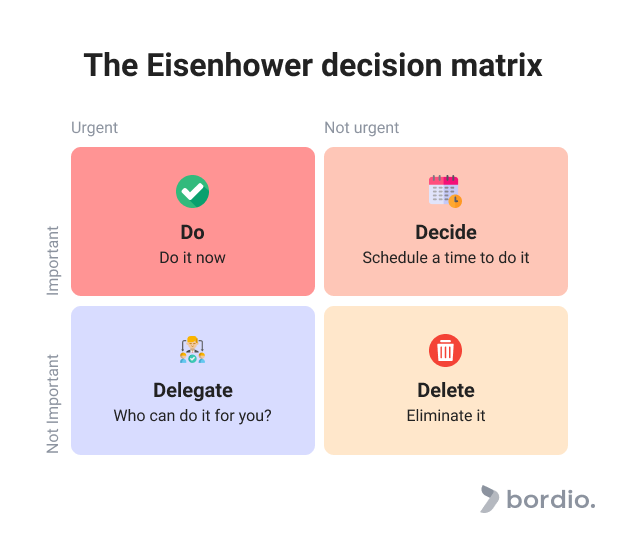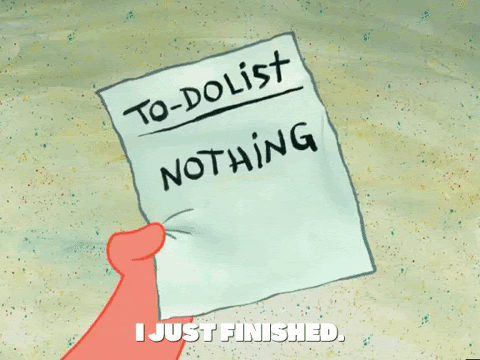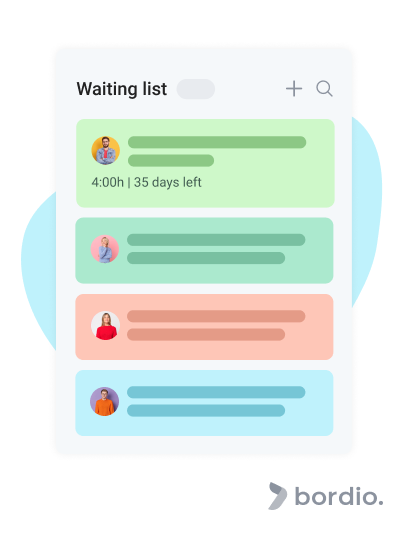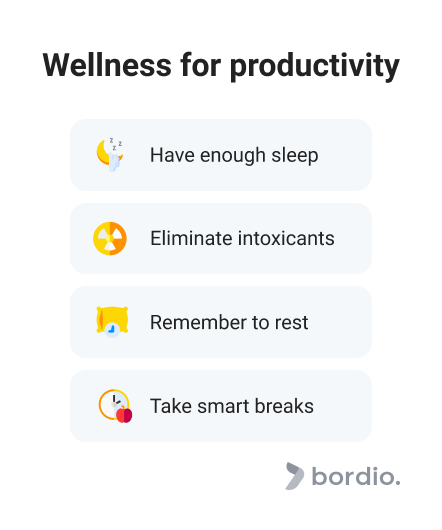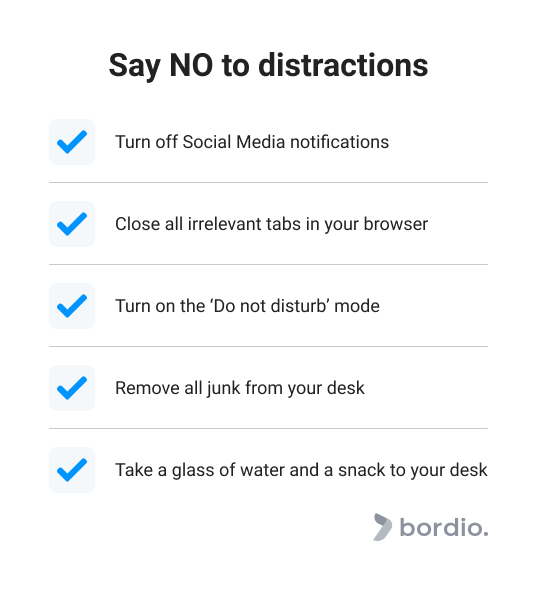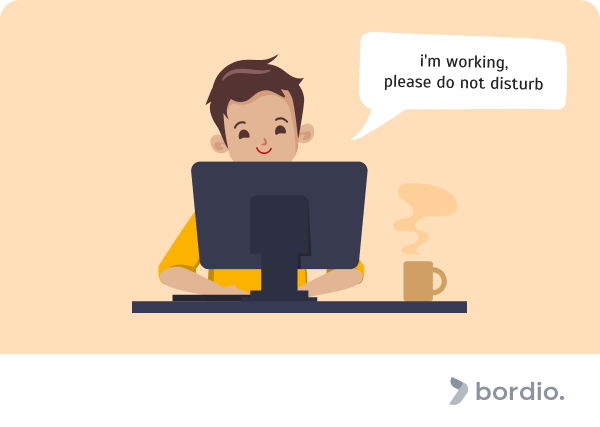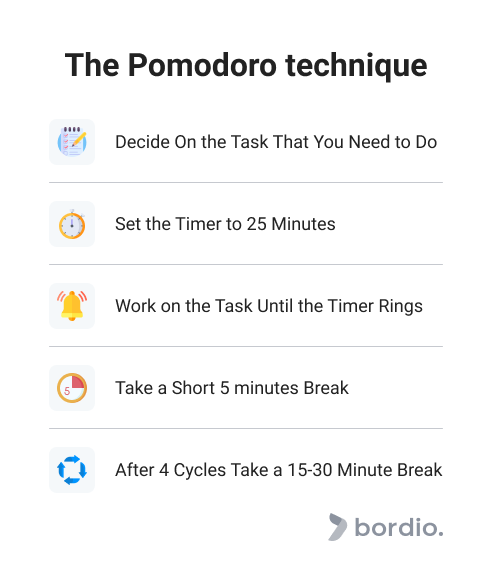Every minute of our life is priceless because once it’s gone, it’s gone. None of us knows how much time we have left, which is simultaneously frightening and exciting. So naturally, an important question comes up: What would you like to accomplish before you go? What are your hopes and dreams?
Many have an illusion that they will live forever, and there is plenty of time for everything. And while some of us are lucky and will live a long, eventful life, it will not be the case for everyone unless they put some effort into it.
The delayed life syndrome, when a person believes all good things await in the future, is becoming more widespread and starts to seriously damage our current lives. Yet, such a future never comes, so the sooner we go back to reality and gain back control over our lives, the better.
At Bordio, with team productivity software, we believe that taking charge of one’s time inevitably leads to a positive change. When you are conscious about your goals, tasks, and schedules, you tend to do more and live an active life.
Time management doesn’t guarantee that all your aspirations will come to life. But not caring about how you spend your time drives you further from becoming the person you want to be. And while there might not be enough time to do everything, you can make enough time for the most important tasks and projects.
The good thing about time management is that it’s never too late to start, and there is almost always something you can work on. And in today’s article, we gathered a list of time management tips that you can apply to start improving your life today.
Just like the old song goes, it’s the first day of the rest of your life!
Time management tips and how to apply them
So, without further ado, let’s talk about the time management tips we’ve prepared for you to use along with time management software.
#1 Learn to appreciate your time
Now, don’t roll your eyes, please! As cheesy as it may sound, a lot of people really need to start appreciating their time.
If we think about it, time is our life. And until humanity invents the time machine or some kind of time stretcher, we can’t control or influence time. What we can influence, however, is our actions. What we do ultimately dictates how we live.
Say you are commuting each working day and it takes you 1 hour in total. One hour a day is 5 hours a week, 20 hours a month, and 240 hours a year. That’s like a month of full-time work! Imagine you spend at least half of that time listening to audiobooks, reading lectures, or learning a language. The progress that you would get by the end of the year would be huge. And we’ve just tapped on a single hour in your day.
Take a closer look at how you spend your time. How many hours are you wasting? If you are not mindful about your days, there is a great risk of living a dull life.
Ps, listening to audiobooks while doing something else is our favourite productivity trick. If you wonder what you could be listening to, we have 3 book lists for you with recommendations for reads about time management, productivity, and project management.
#2 Identify and eliminate time wasters
Run a quick time audit to spot how you waste your life. Are you watching endless YouTube videos? Playing computer games? Scrolling through Instagram? Or maybe you take long personal phone calls when you know you should be working?
Whatever your time waster is, treat it like a cockroach. You wouldn’t want to keep a roach in your apartment, would you? Then why do you hang on to those practices that damage your life?
You will require the self-discipline to do that, and you might slip along the way, but don’t worry. It’s important that you continue no matter what.
#3 Define your goals and write them down
We all have dreams about the future we want to have and the person we want to become. Dreams tend to remain a fantasy unless we do something about them. And the number one thing to do is to define your goals.
Goals are attainable. And if you write them down, set a deadline, and keep coming back to them, there is a much higher chance that they will come to life. Writing down goals boosts motivation, makes you remember your goals better and focus on them more.
For example, you want to travel and work remotely. Set a goal to do that in 12 months and write it down in your calendar planner app. Next, create a list of things you need to do, such as saving money, learning a new skill and/or language, etc. Set sub-goals for the entire year and work slowly towards your dream.
Written goals stay in the back of your mind whatever you do, making you go back to them more often, take action here and there, and spot opportunities that could lead you closer to your goals.
We talk more about goal setting in the Productivity Tips Everyone Needs to Adopt article, so make sure to check it out as well!
#4 Be mindful of every minute
Change the way you do things to make the most of your time:
- Listen to podcasts when you clean the house or drive somewhere.
- Read work-related literature and articles during breaks and lunchtime.
- If you go back to flying on business after the pandemic, skip the happy hour in the airport. Instead, use the downtime to catch up on books or review the work projects that you never have the time to do in normal life.
- Got stuck in the bank? Catch up on emails while you’re in line.
- Waiting for work files to download – review your personal to-do list and see where you are instead of logging to Facebook.
There are so many small practical tips out there that change your time management game! Stay open to new ideas and implement new practices gradually for best results.
#5 Plan ahead your life: work and personal
Don’t make life just happen to you. Plan it! The best way to plan your day is the evening before. And the best way to prepare for your week is on a Sunday before it starts.
Planning the whole week in advance is great for many reasons.
First of all, you can list all the tasks that you have to do (that you know of) in the free online task tracker and take a look at them. That allows to have an accurate picture of the workload and plan smart. For example, you will need to block several time slots within the week to make time for a report that takes 8 hours to complete. Without planning, you are likely to forget about it until the night before it’s due and end up rushing through the job.
Secondly, you can spot any dependencies and prioritize the tasks accordingly. Let’s say you have two tasks where you need input from someone else and one task where you are dependent on a colleague to complete their part first. If you reach out to the third parties at the beginning of the week, you will get an update/response from them earlier and will be able to complete your task on time. In that case, if something is not clear or they need more time, there are still a few days in the week to address it.
Thirdly, it is much easier to prioritize tasks and see what’s most urgent and important with a list of tasks in front of you. If you are still struggling with setting priorities, try the Eisenhower matrix model where it makes you allocate all tasks in 4 categories based on their importance and urgency. You can do this in a paper planner or an advanced time planner for this kind of work.
Fourthly, if your task list has a lot of similar smaller tasks, you can use task batching to get rid of them in one sitting. Task batching is working through similar jobs at once. E.g., if you need to make several phone calls or send a bunch of emails, you can set time blocks based on the type of the job in your weekly planner app. The theory behind this is that different tasks take different moods and energy. So, it is quicker to write 10 emails one after one than make a call, send an email, write a report, send another email, and so on. In the end, plan your schedule and it will be easier and easier for you to do things by checking it. For that, you can use the schedule builder app – it will be easy to access your plan anywhere and anytime.
An alternative take on time batching is grouping related tasks and working on them. For example, you have a report where you need to do some writing, fact-checking online, make a call to confirm details with a colleague, and answer emails about it. You can batch all these tasks together as they are all linked to that one report.
#6 Write down everything you need to do and stick to this plan
Have a to do list in front of you and stick to it!
The secret here is to make challenging but realistic plans. If you plan too little in your online daily planner, you might waste the rest of the day. If you plan too much, you get overwhelmed and just drop it. So try to have an optimal workload scheduled and then grind until you’re done.
Bonus tip: set time limits for the tasks. You can do it in your free task maker – there will be a time setting with notifications. When you have a strict time limit for the day, you are less likely to waste time waiting for the muse to come, as you know that once this hour is done, you’ll have to move on to the next thing on the to do list.
#7 Create a single system to store all your to-dos, projects, and notes
All time management strategies say the same thing: one of the most critical skills you need to learn is having and maintaining a single place for your task lists, project data, and notes.
Spreading all that information across multiple devices is not good. The human brain is easily distracted, so it is almost impossible to stay focused when you jump from one app to the other to double-check something. One minute you are reading through your daily tasks, and next thing you know – you are catching up on text messages from your friends, and now you’ve wasted 20 minutes.
With your tasks and plans written in 5 different notebooks, there is hardly a chance to make an effective plan for the week because you simply don’t see the big picture. Bordio helps combat this issue with a combination of lists with daily tasks and a waiting list for unscheduled jobs.
So, if you have something on your mind that you don’t want to put on a to do list, you can leave it on the waiting list. That way, your daily plan is not cluttered, but your ‘someday’ tasks are visible as well. And if you have multiple projects that you work on and also like to make extensive notes – Bordio has you covered! The software supports personal and team workspaces, so your privacy is protected for those sensitive projects. And the advanced notes system has all functionality that you need for detailed notes and plans.
#8 Detect unimportant tasks and remove them
The worst time wasters are little jobs that don’t really need to be done. Some tasks are just useless. They don’t serve your purpose and help your goals, so you shouldn’t be doing them at all.
Go through your tasks and chores. You can use the GTD Mind Sweep method famously designed by David Allen to do it. Determine the ones that make no sense and discontinue them. Do not feel guilty and watch it make a massive difference to your future.
Bonus tip: if you are not ready to immediately drop some of the tasks, create a separate list for them and re-visit it a week later. Hopefully, you will have more courage to ditch the unnecessary elements of your to do list by that time.
#9 Delegate what can be delegated
Not all tasks have to be done perfectly, and not all tasks have to be done by you. No matter where you work and what your life looks like, you have something that can be delegated.
Determine what you’d like to pass onto other people and then find who you’d like to hire for the job. Some tasks are more important than others, so it makes no sense for you to do everything. Instead, focus on the tasks where you have the most expertise and can deliver the most value.
Pro tip: if you are worried about the other person not doing the job just like you want, explain all details to them, and then ask them to repeat it to you. People remember things the best when they are working actively with the information (e.g., repeating what they’ve just been told).
#10 Review your commitments from time to time
Look through your commitments every now and then, and see if something needs to be dropped or outsourced.
It’s very easy to end up with too much on your plate. You say yes to a couple of new projects at work, offer to help with volunteering at church, then something with the family comes up. And just like that, you find yourself swamped with obligations you can’t meet.
Time is a finite resource, so before you agree to one more commitment, always look back at what you are currently doing. See if you can realistically agree and not feel overwhelmed. If not, try discontinuing one of your previous commitments before going ahead with a new one.
Just like time, your energy is also not endless. Stretching yourself too thin will only make you less productive with each task and more stressed.
#11 Have a waiting list of tasks
Not all tasks are relevant for the upcoming week or even month. Yet, we need to keep them in mind and get to them when the time comes.
The best solution to keep track of such tasks is to have a waiting list where all unscheduled activities go. Instead of using many to do lists, write down and store everything in the waiting list.
The waiting list helps in 2 significant ways:
- When you plan the upcoming days or weeks, you can have a peak in the waiting list to see if any of those tasks should be scheduled (instead of going through multiple to do lists or trying to remember what else you need to do).
- If you are in the flow and have completed all the work for the day/week, you can take a task from the waiting list and keep working. It would be a shame and a waste to stop working when you are, in fact, very eager and motivated, just because you can’t think of anything else to do.
#12 Understand when you are most productive and make the most of it
Some people wake up and grind first thing in the morning, and others like to take a slower approach to the start of the day but then are extra productive in the afternoon.
Look back at your working style and rhythm. What tendencies do you see? Once you understand what parts of the day are most productive for you, plan all creative and difficult tasks in this time slot. Leave the routine and less energy-consuming tasks for the rest of the day.
#13 Leave open spaces in your calendar
There are many good time management skills that you can adapt, and one of them is not scheduling too much or back-to-back.
How often does everything in life go according to plan? Exactly. Things come up, whether it’s an unexpected and very urgent task from your supervisor, a family emergency, or you catch the flu all of a sudden. If your schedule is packed with tasks and events, any change or delay disrupts the rest of the day.
The golden rule is to assume that everything will take longer than you anticipate. If you finish the board meeting on time – great, now you have 15 minutes to make a cup of tea, get some fresh air or just wind down. If it overruns, then there is no issue because you planned for it.
#14 Set internal deadlines before the actual deadlines
Let’s say the project manager wants you to prepare a project review by Friday, and you aim to finish it on Thursday. That way, you’ll have an extra day if something goes wrong along the way and it takes you more time to complete the job. Also, you won’t leave it to the last minute, so more thought is likely to be put into the work. And we want to do a great job, right?
Tip: If you still missed the deadline, make sure to follow our tips from the guide of apologizing to your boss.
#15 Forget multitasking
We can’t say it enough! Multitasking does not exist. Pop culture tricked us into thinking that a human brain can do many things at once. In reality, our poor brain jumps from one task to another in milliseconds, focusing on every job just a little before being distracted by the other things we are working on. The same task that would take you one hour to complete suddenly takes 2 hours if you mix it up with a couple of other things on your to do list.
So, instead of torturing yourself, focus on one task at a time. If you do that, the task will take less time to complete (compared to when you juggle it with 4 more), and the chance of you making a mistake decreases dramatically.
Try it, and watch it do wonders for your productivity.
Make your well-being a priority
You have to feel your best to perform your best. Here are 4 tips that combine time management and wellness.
#16 Have enough sleep
And no, your partners didn’t ask us to put it here!
Sleeping is a vital human activity that forces the body to regenerate, relax, and heal. Its importance to our lives is undeniable. Yet, somehow, many people worldwide confess and even brag about their regular insufficient sleep hours.
You might think that sleep is counter-productive. Instead of finishing up that report for a couple of hours, you go to sleep. What a waste, right? Wrong!
The truth of the matter is, sleep deficiency ruins our productivity. When we work on tasks, especially the tricky ones, we spend time and energy. Now, if you’ve only slept 5-6 hours over the last few weeks, your energy levels will be lower in general. And it means that each task will take you more time to finish, you will be easily distracted and unproductive. So, a presentation that should normally take you 1 hour to wrap up will take 3 hours of work.
In the end, you will not be able to work through your to-do list even if you work 20 hours a day.
Matthew Walker, a scientist, has written a book called ‘Why we sleep’ that decomposes the process of sleeping. It is based on numerous researches and concludes that 8-9 hours is the optimal sleeping time for most people. Definitely not 5 or 6 hours. It’s OK to hustle for a few days if you are finishing up an important project, but it cannot be your everyday lifestyle.
#17 Eliminate intoxicants
Cigarettes, alcohol, and other drugs are not good for you in general and especially not good for productivity. There is some kind of myth, which is probably a result of romanticization through movies and books, where geniuses get inspired while taking suspicious substances.
In reality, though, all those substances are slowly ruining your ability to work and perform. If you drink alcohol, your body will have trouble going into a deep sleep at night. So, even if you sleep 9 hours, you will not feel your best because the sleep quality will be low.
#18 Remember to rest
We’ve just covered the importance of sleep for high energy and productivity levels. Besides sleeping, we need other kinds of rest too. And we don’t mean mindlessly watching TV to decompress because it might feel like resting, but it doesn’t relax your body, mind or soul. The better alternatives would be taking a walk in the fresh air, working out, visiting a SPA, or meditating.
#19 Take smart breaks
Rest is essential not only after work but during work as well. You need to take breaks to stay energized and avoid burnout.
Yet, as we know, taking a break can quickly turn into a couple of hours of downtime, so we have to be careful. A good break will facilitate your work and not ruin it.
First, take breaks only when you finish the task. If you know that you can eat and stretch only after your proposal is made, you are much more likely to work efficiently and focus on the job better.
Second, during the break, try changing your position (stand up and move around if you sit at your desk), drinking water, and eating a healthy snack.
Limit the time of your break to 5-15 minutes and get back to work. If it is longer, you will lose focus and spend extra time getting back into the swing of things.
#20 Wake up earlier and start your day with healthy activities
By now, we have all seen the videos and read the books where successful millionaires and billionaires share their morning routines. There are some variations, but the general rule is that they wake up early and start their day by exercising. Scheduling things in advance will reduce your stress levels – and it’s an excellent start to the day, so use schedule maker weekly in the mornings.
Tip: If you’re curious how successful people plan their day, then you’re in luck! We have an article just about that.
There are many theories why an early morning leads to a successful life. Here are some of the points:
- An early start to the day gives a feeling of a head start and increases motivation.
- As the rest of the world is still asleep, you get a big slot of uninterrupted, focused work.
- Working out in the morning gives an energy boost. Plus, it’s more likely that you will do the workout in the morning than after a full working day when you’re tired. And the stronger you are, the better you feel and the more eager you are to perform well.
The critical point here, though, is that you can’t compromise your sleep. Waking up early means going to sleep early. Remember: your body needs 8 to 9 hours of sleep daily.
Remove all distractions when you are working
First things first:
- Turn off Social Media notifications.
- Close all irrelevant tabs in your browser.
- Turn on the ‘Do not disturb’ mode.
- Remove all junk from your desk.
- Take a glass of water and a snack to your desk.
Hardly any focused work can be done with constant distractions. Messaging, dealing with paper clutter on your desk and running to the kitchen will keep you from achieving what you want in the time you want.
#21 Dealing with messages and notifications
Understandably, it is unrealistic to not check your phone/messages/social media for the entire working day. You want to make sure your loved ones can reach you and that you will be available should anything urgent happen.
If you’d like to stay on top of your incoming calls/text but be productive at the same time, make a conscious decision to check your phone every couple of hours. Because let’s be honest – there is rarely a real emergency, and we are mostly reaching for the phone to get distracted by cat memes. And every time you look at your phone screen, you risk going down the rabbit hole of time-wasting.
If you want to remain productive and complete tasks on time, limit yourself to checking the phone only a few times a day and not spending more than 10 minutes on it.
#22 Don’t answer every single email you receive
Some people feel obligated to answer every email they get. But the truth is that you don’t have to do it. Feel free to delete all general and spammy-feeling emails that you receive. Also, responding simply to decline the offer is unnecessary. Lastly, consider using an SPF record checker to enhance email security and protect against phishing threats.
#23 Don’t answer every single phone call
Same as the point before – do not feel like you must take calls from everyone. It is especially true if you are in a decision-making position. People will be calling you about anything, wasting your time and distracting you from your primary job. They most probably have your email address, and if they call you, they have your number, so they can message you instead.
Now, it’s a little different if you know the caller and if they work with you. Still, the general rule is to keep working on your task and give them a call back when you’re done. If you want to be extra polite, you can decline the calls with automatic SMS that would say: ‘Sorry, I can’t talk right now, I will call you back later’.
#24 Avoid idle chit-chat in the office
When you ask someone what they waste most of their time on, the top responses are meetings and chit chat. It can take as much as a couple of hours a day in total to speak with your co-workers about non-work-related topics.
And while building rapport is very necessary, and you need to catch up with the rest of the team every once in a while, it can be detrimental to your output and career prospects if this is your daily routine. So, next time you notice that you are already chatting to someone for 10 minutes, excuse yourself and get back to work. It might not be easy or pleasant, but it will affect your performance greatly.
#25 Establish routines and stick to them
Everything is hard until it’s easy. Once you make something into a habit, it takes minimal will- and brainpower. When we do things out of habit, we do them almost automatically. The best project management tools of 2023 help in building habits will help, of course.
One of the secrets to success in business and personal life is forming those good habits and creating healthy routines that will support you in achieving your goals. For example, reading before you go to sleep (instead of catching up on reality TV) will get you closer to your goal of reading more. Plus, it will put you in a calm state, just what you need before going to sleep. Eating fruits in the morning (instead of chocolate muffins) will make you healthier, fitter and less likely to catch a cold.
#26 Try listening to something when working
Everybody has different preferences when it comes to soundtracks for their work. Some of us prefer a quiet room, while others enjoy a company of a playlist or a radio buzzing in the background. Try experimenting with different music and ambience sounds to find something that you’d enjoy.
Having a similar soundtrack (or the lack thereof) helps many people get focused. Kind of like with a Pavlov’s dog: your brain reacts to certain sounds/situations associated with working and puts you in the right mood.
#27 Stay conscious, and don’t let distractions get to you
Our brains don’t like to work hard and be stressed. So, when you are working on an important task, it is common just to switch off and 20 minutes later realize that you’ve eaten a donut, scrolled Facebook, chatted with a colleague about the most random thing. And you have no idea how you got here.
Sounds familiar? Don’t worry. The brain sabotaged the best of us. And we have good and bad news for you. The bad news is that we cannot eliminate this behavior. The good news is that we can control it and reduce it with practice.
So here’s our advice:
- Track such behaviors and stop them when you notice you’re digressing.
- Identify what you do when distracted (social media, video games, YouTube?) and remove those things from your surroundings if possible.
#28 Use Pomodoro technique or simple timers
Pomodoro is one of the popular time management tools that is used to structure your working day. The traditional Pomodoro implies that you have four 25-minute sessions with 5-minute breaks between them.
The logic is that you stay focused on the task for 25 minutes with no interruptions, followed by a quick break and then another session. Pomodoro helps thousands of people complete tasks faster, and there are many apps and playlists available online. YouTube has many themed Pomodoro playlists with Harry Potter sounds, Lord of the Rings music, or any other major fictional universe. But be careful not to click on those funny animals compilation videos!
#29 Invest in good work equipment
Many people disregard the equipment they use for work as something not important. Yet, things like using inconvenient software, struggling with old and slow PCs, and lacking a second monitor reduce our productivity and job satisfaction levels.
Often we get used to inconveniences thinking that it’s fine as it is now. Or we can be lazy to look for alternatives or not willing to spend extra money.
A lot of the time, it takes just a few minutes to find a better solution for our needs, and it often costs just a few dollars a month. Get into the habit of improving your daily life with the additional resources (whether it’s a new piece of equipment, a software program or something else).
You manage your time not just by prioritizing tasks and delegating work to someone else but also by being mindful of yourself and how your work environment affects the task at hand.
#30 Finish what you started
Bad habits keep us from accomplishing important tasks.
So many people start working on specific tasks, get distracted, and never finish what they’ve started. You might think it is not a big deal, but really every time you drop a half-finished task, you are wasting time. A couple of completed tasks deliver more value than ten unfinished ones.
There is no point in learning about effective time management tools if you drop unfinished tasks left and right. Before you commit to a talk, ask yourself if you have enough resources to finish it. If the answer is no, – push it back. If you estimated that you could do it, make sure you deliver.
Final thoughts on time management tips
Good time management leads to a better life.
If you manage your time effectively, you achieve more in your career, have time for hobbies and leisure, and feel better because there is no constant stressing about failing at something.
Some of the time management tips that we shared today might feel like a chore at times. But understand that they are all designed to help you build a wholesome life. If you work on gradually implementing all of them in your routine, you are guaranteed to see improvements in your relationships, projects, and self-perception.

